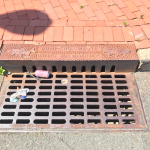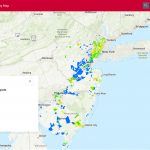New Jersey Future Blog
New NJDEP Watershed Improvement Plan Requirement and What This Means for Municipalities
January 4th, 2023 by New Jersey Future staff
By Lindsey Sigmund and Patricia Dunkak
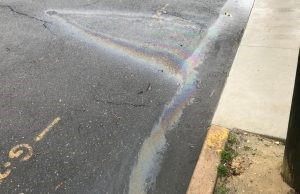
Stormwater picks up oil, trash and other contaminants. If it is left untreated, the stormwater conveys the contaminants into streams. Photo credit: Andrew Tabas. Location: Bordentown, NJ
In our highly developed state, upgrading and retrofitting New Jersey’s stormwater infrastructure and reducing impervious cover is a key way to address nonpoint source pollution. It is estimated that up to 60% of the State’s existing water pollution is attributable to stormwater and nonpoint sources of pollution. Stormwater best management practices (BMPs), including green infrastructure, are an integral part of improving the quality of New Jersey’s lakes, rivers, streams, and bays, and reducing dangerous flooding events worsened by climate change.
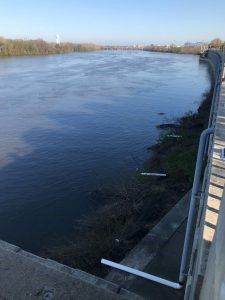
Pipes convey stormwater from impervious surfaces into the Delaware River. Photo credit: Andrew Tabas. Location: Trenton, NJ.
New Jersey’s Department of Environmental Protection’s (NJDEP) newly issued MS4 permit reflects a move toward watershed level planning for addressing water quality issues and flooding in New Jersey’s communities. The 2023 Tier A Municipal Separate Storm Sewer System (MS4) permit went into effect on January 1, 2023, and the implementation of its requirements on the local level will help address water quality and stormwater issues related to new and existing development. New Jersey already has a high number of impaired water bodies and experiences frequent flooding. The problem is anticipated to get worse: according to the New Jersey Scientific Report on Climate Change published in 2020, “surface and groundwater quality will be impaired as increased nutrients and contaminants enter waters due to runoff from more intense rain events.” The new MS4 permit is an opportunity to improve local implementation that will protect New Jersey’s waterways in the face of climate change.
What is an MS4 permit? The state issued permit requires municipalities with separated stormwater systems—essentially any municipally owned stormwater infrastructure that is not a combined sewer system (CSS)—to address their Total Maximum Daily Loads (TMDLs). The TMDL program identifies impaired streams and the pollutants contributing to their degradation. Despite prior MS4 permits and their requirements for municipalities to address water quality impairments, an overwhelming number of municipalities have not achieved compliance, and many of New Jersey’s waterways are still considered impaired.
What this new permit means for municipalities. A significant shift from 2018, when the last permit went into effect, is the change in the number of municipalities that are now considered Tier A. All towns previously considered Tier B, over 100 municipalities, have been reclassified as Tier A. This reclassification means all of New Jersey’s municipalities are subject to permitting obligations informed by federal regulations, which include more stringent requirements set forth in the Clean Water Act. Another significant change from 2018 is the inclusion of a Watershed Improvement Plan (WIP) requirement. The WIP process and its eventual implementation will begin to address nonpoint source pollution throughout New Jersey. This process includes three phases for communities to map out actions to improve water quality by reducing pollutants and reducing or eliminating flooding in municipalities. The three steps to the WIP process over the five year permit cycle include:
- Mapping: Municipalities are required to map all publicly and privately owned stormwater infrastructure, impervious cover, and other relevant data by 2026.
- Planning: Communities will outline potential water quality improvement projects, provide an estimate of funding necessary for these improvements, and provide other relevant water quality data by 2027.
- Final Plan and Implementation: Municipalities will submit final project locations for water quality improvement projects by 2028.
Despite progressive state requirements, there will be compliance obstacles. Resources are currently available for municipalities to get started, but more guidance and technical assistance is needed to ensure compliance, especially for reclassified Tier B permittees. New Jersey Future and partners will update and provide resources for MS4 permittees made available through the New Jersey Green Infrastructure Municipal Toolkit. Another obstacle is funding. NJDEP has identified stormwater utilities as one of the potential funding mechanisms for WIPs and other MS4 permit obligations. Stormwater utility fees, based on how much hard surface, such as rooftops or pavement, is on a property, provide a dedicated source of funding for upgrading and maintaining stormwater infrastructure, including green infrastructure. However, state agencies could and should provide additional funding through grants to supplement financing provided through the state Water Bank to ensure compliance.
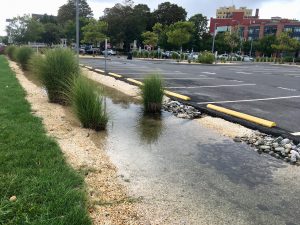
Bioswale in a parking lot in Asbury Park, NJ. Image Credit: New Jersey Future
Stormwater pays no mind to municipal or political boundaries. This new state mandated watershed planning approach to addressing water quality and flooding is a step in the right direction. However, watersheds, much like flood waters, do not follow municipal boundaries. Therefore municipalities should be working together to share resources and plan on a regional level to effectively address stormwater issues in their watersheds. If properly implemented, this new permit will improve water quality and reduce flooding, which is more important than ever as New Jersey braces for and seeks to minimize the impacts of climate change.
Related Posts
Tags: green infrastructure, mainstreaming green infrastructure, MS4, Stormwater, Water quality, Watershed, watershed improvement plan

